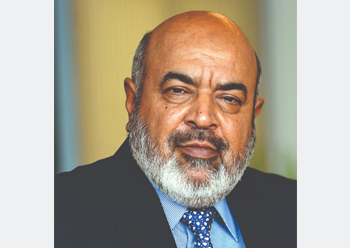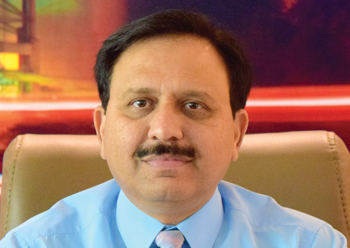Fauji Cement eager to enter GCC market
01 November 2018
Fauji Cement Company, a leading producer of quality cement in Pakistan, is eyeing the great potential the Gulf market offers for its products, which look set to be preferred for the many mega projects here.
Established in 1992, the company manufactures high quality and refined cement and products including ordinary Portland cement (OPC), sulphate-resistant cement (SRC), low-alkali cement (LAC) and low heat of hydration cement (Type IV), which are renowned the world over, Muhammad Ashraf Malik, the company’s manager export, told ABDULAZIZ KHATTAK of Gulf Construction.
 |
|
Ahsan Mahmood ... GCC production focus. |
Fauji Cement also offers its Mohafiz brand, which is stronger than ordinary cement.
Its products are suitable for all types of construction, whether high-rise buildings, road and rail, infrastructure, and hydropower projects, he states.
The company operates two lines, with a total annual capacity of 3.55 million tonnes near the city of Attock – one acquired from FLS Denmark (producing 3,885 tonnes per day) and the other from Thyssenkrupp Industrial Solutions (TKIS) Germany (7,980 tonnes per day).
Malik said OPC, which contains 95 per cent clinker and 5 per cent gypsum, is suitable for general construction. It has high early and final (28 days) strength with increased fineness.
Elaborating on the features of the SRC, Khizar Sultan Raja, general manager, marketing and sales department, said the specialised cement protects structures against corrosion especially in coastal regions, where there is an abundance of sulphate salts.
“The SRC’s low C3A contents makes it highly effective against sulphate and chemical attacks, and can be used to protect underground construction (basements and foundation), and sewerage systems.”
SRC attains a high comprehensive strength of up to 9,500 PSI (exceptionally high compared to other products in the market) in 28 days.
Low alkali cement, he said, is recommended for heavy concrete structures like splash zones at seaports, dams, runways, high-rise buildings and hydropower projects. It has a high compressive strength and is effective for mass concreting. It is resistant to alkali aggregate and alkali silica reactions.
The low heat of hydration cement is specified for concrete areas that remain mostly submerged like in hydropower plants. It protects against fungal and algal attacks.
As for Mohafiz, this has less strength compared to low alkali and is mostly used in the basements, and foundations of buildings up to 10 storeys, sewerage systems, water tanks and canal linings.
Raja says Fauji Cement is now looking at launching two to three new cement products. One of these is Pozzolana, named after the naturally occurring material, which is effective for concrete structures in sub-zero temperatures.
Currently, Fauji Cement supplies mostly to the domestic market across Pakistan, mainly to local projects by foreign companies, including China Machinery and Three Gorges Dam Company (TGDC).
The company is fortunate to have raw material readily available in the factory’s vicinity.
In the fiscal year 2017-18, Fauji Cement supplied over 3.4 million tonnes, an increase of 16.47 per cent over the previous year. This was made possible due to enhanced capacity utilisation: 97 per cent in 2017-158 compared to 85 per cent in 2016-17, Malik said.
He said business has been rising rapidly due to increased domestic demand. Fauji Cement, therefore, has plans to expand capacity by another 12,000 tonnes per month in three years’ time, according to Raja.
Turning to the Gulf region, he said Fauji Cement is interested in setting up joint ventures and investing in the cement sector. There are plans to supply to the Bahraini market – mainly to high-rises and mega projects – where Fauji Cement’s product samples have already been approved by the Ministry of Works.
Meanwhile, Bahrain-based industrial engineering company Cellmac is facilitating Fauji Cement to establish business in the country.
To increase market awareness, Fauji Cement has already attended two exhibitions in Bahrain – the Gulf Industry Fair in February 2018 and Gulf Construction Expo in April 2018 – where it generated leads and got in touch with some potential mega clients.
To facilitate access to the GCC market, Raja said there are plans to set up a grinding facility in Gawadar, home to the world’s largest deep seaport in Pakistan. “This will allow us to reach the GCC markets in two days’ time,” Raja said, adding the company has just started opening up and is increasing its footprint.
The EN ISO 9001:2015-certified Fauji Cement last year generated net sales of Rs21,161 million ($158 million). All its products conform to European (EU), British and American standards (ASTM). It has a dedicated research and development (R&D) department and laboratory.
Ahsan Mahmood, the managing director and CEO, attributed Fauji Cement’s success to its quality. “We actually sell the prime brand, and make sure we don’t compromise on quality.”
In line with its commitment to the environment, Fauji Cement has commissioned a 12-MW waste heat recovery power plant at its facility.
Also as part of its corporate social responsibility, Fauji Cement provides free education to children and clean drinking water in Attock, and has also built medical facilities and a vocational training centre and planted over 100,000 trees there.
- Acwa emerges lowest bidder for Bahrain IWPP
- Paras brand gains popularity
- Consultancy bids soon for $4bn causeway
- Kimmco-Isover is insulation leader in Mideast
- Linesight manages over $10bn projects in GCC
- Oman to develop $1.6bn solar projects
- Consultants sought for waste-to-energy plant
- Oman-Saudi road set for completion
- ASC picked as Genie distributor
- ACI names director for Middle East
- E K Kanoo opens GCC’s largest LLumar facility
- Gulf Plastic enhances response time
- Fauji Cement eager to enter GCC market
- Laying foundations for sustainable construction



